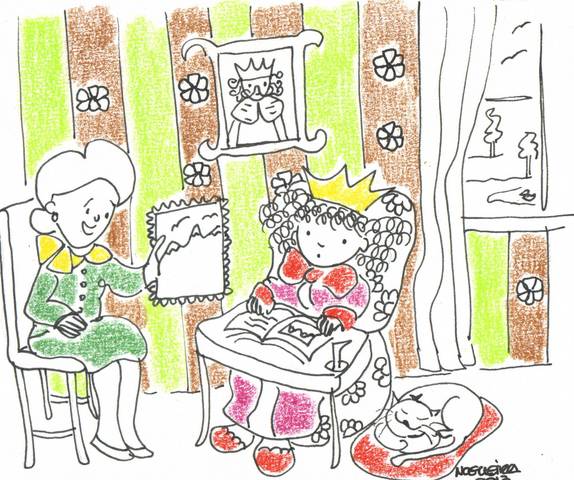Children and Media
We want our children to be socially at ease, to learn how to think for themselves, and to be able to take initiative. Yet the traditional teacher-led classroom is in many ways a factory model of education. The model we still use today was invented in the Victorian Age, when children started to attend school in large numbers and we’re meant to learn how to accept authority in preparation for their future contribution to society. Hierarchical organisations such as the church and the military were the founding bodies that ran schools to an industrialists’ model.
In contrast, the most privileged children in society have always enjoyed individual supervision in very small groups. Take the British aristocracy, for example, who until William and Harry’s generation were traditionally educated at home in a very exclusive small group by a governess throughout the formative years. This was finally changed by Princess Diana, who was a preschool assistant in adult life but was educated herself at home until the age of nine.
Not so for the masses. Governments to this day see the value for working parents of institutionalised childcare and education. Teacher training courses assume that a basic part of the job will be how to manage behaviour and learning in large groups, and in State systems this emphasis can detract from their main task – inspiring future generations who will enter the world of work and support their families.
Is it not time to give media a chance to help in the re-structuring of education, given the number of technological solutions that encourage individual learning?
In private and alternative schools teachers have developed methods so that more children today can enjoy the benefits, previously reserved only for the rich, of more individual attention in smaller classes. But the smaller the numbers in a school, the less subject specialism there is. This is not a problem in the early years, but could middle and secondary schools perhaps employ technology and Internet resources more extensively to provide the ultimate individualised curriculum?
There are inspirational uses of screen media and the Internet to replace specialist subject teaching, as you can see in this description of the innovative Khan Academy: http://www.youtube.com/watch?v=gM95HHI4gLk
Online tutoring abounds; in fact, the largest university in the world, with 250,000 students (50,000 overseas), is the Open University, which moved more of its courses last year to virtual tutoring from the U.K.
We are increasingly seeing the intellectual dimensions of computer games both on our Smartphone apps (try Wordfeud!) and in our homes, even for young children. One of my son’s favourites some years ago, which I enjoyed doing with him, was a Scooby Doo mystery computer game that really made him think and develop problem-solving skills. Of course, parents do not need computer games to help children learn such skills. Given the anti-social, addictive and sedentary nature of screen time, I support the limiting of screen time for children until they are old enough to appreciate it and to try to manage their own addictions! Because addictive it certainly is.
Oct 2012: “A review of the evidence published this week in the British Medical Journal’s archives of disease in childhood said the sheer volume of screen time experienced by children in early years of development could cause serious cognitive issues as well as long-term physical harm.
The original study, published in the Archives of Pediatrics & Adolescent Medicine in 2010, followed 1314 children born in Quebec in 1997 and 1998.”
http://www.stuff.co.nz/life-style/wellbeing/7796541/Electronic-babysitter-bad-for-kids
Perhaps it is the constant flickering light in screens, or the speed with which technology can respond to our still-forming emotions (without us needing to wait to process our thoughts and integrate them with our inner emotional worlds). Or maybe new media appeals to the part of our brains that works differently when we are allowed to move! For whatever reasons, research on pathological screen use points to obesity, sleeplessness and deteriorating home relationships as a direct result of too much TV and too much isolated screen use. This is common sense. There are only so many hours in the day, and the more time you spend sitting down, the less exercise and sociability you get from other, more mobile, activities. A study in New Zealand following TV habits pointed out:
Researchers said that pre-school was a critical time for brain development and that TV watching displaced time that could be spent engaging in “developmentally enriching tasks.”
In addition, information technology (IT) surely cannot inspire in the way a real, live teacher can. From my own experience of online courses, as a relatively social being, I find it hard to feel motivated by plastic and metal. On the other hand, the access to distance learning made possible by TV lectures and programmes at all hours cannot be faulted. Modern interactive media give many possibilities for child-initiated learning. And not least, surely we have to enable children to learn through doing something they enjoy?
Unfortunately, a thoughtful IT curriculum is unusual at the moment, and designing new ways of using technology may as well wait, in such a fast-changing industry. Children will be manipulating data in the air by the time current primary school children are at university. Even software and computer programming understanding is changing apace.
Another Study
http://www.nzherald.co.nz/nz/news/article.cfm?c_id=1&objectid=10642599
This New Zealand research is based on 1037 people born in 1972 or 1973 and followed through to adulthood by Otago University.
It has found links between watching too much TV in childhood and later problems, including obesity, high cholesterol, poor fitness, smoking, short attention span, poor concentration – and lower rates of school and university qualifications.
One of the researchers, Dr Bob Hancox, said the educational effects of television viewing could not be explained by intelligence or socio-economic factors: “It’s not just that children with little natural ability decided to watch more television. Children of all levels of intelligence did worse if they watched a lot of television…”
Who knows what our children will need to know and learn in five years, let alone ten. For example, Marko Calasan is the youngest Microsoft Certified System Engineer (MCSE) in the world. His mother Radica was wondering, Should I let my child continue to take these Microsoft exams? Jos Visser, who works at Google Zürich, says, “What he learns in these courses would be useful if he was working now, but by the time he graduates the requirements and curricula will all have changed. Even if children can do software engineering today, they may as well regard it as a hobby rather than necessarily useful for the future.”
However, it is quite reasonable that parents should want their children to be familiar with technology and use it for their learning; after all, schools should be open to new ways of teaching and learning as part of regular professional development. I think the solution at secondary level might be to use handheld devices as a resource, like a calculator, and train children to switch constantly from IT use to human communication, as bilingual children learn to switch languages. We could then incorporate IT as fully as the old pen and paper. Pen and paper – what’s that again?
By Monica Shah
Monica is an early childhood specialist and founder of Children First Association in Zürich, a non-profit association for international families living abroad with young children.
Illustrations by Albina Nogueira
Albina Nogueira has been a primary school teacher since 1992, and a writer and illustrator since 2006. She currently lives in Switzerland, but her homeland is Portugal. She is also the author of Letters to Grandparents and Hairdresser. To find out more, like her on Facebook or see her books in Amazon.






I took my fifth graders on a school trip today. They had to have three questions for the staff at the horse clinic. Do you know where some of the kids had their questions? They were stored on their iPhones! I don’t even have an iPhone, so I was jealous…but only for a minute.